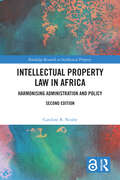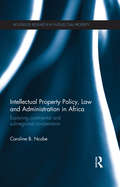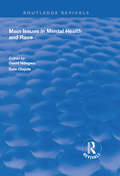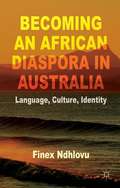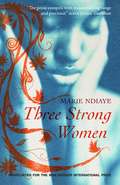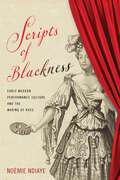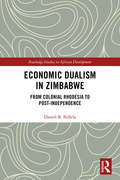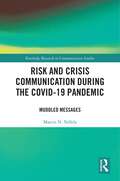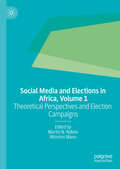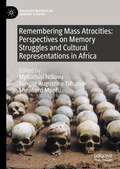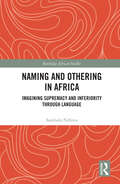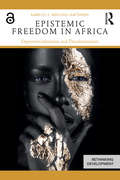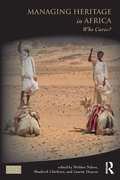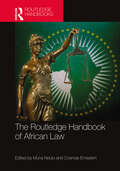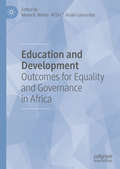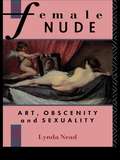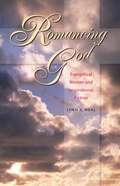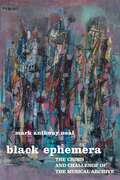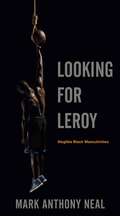- Table View
- List View
Samajik Avam Rajnitik Jeevan Bhag-3 class 8 - NCERT - 23: सामाजिक एवं राजनीतिक जीवन भाग-३ ८वीं कक्षा - एनसीईआरटी - २३
by NcertThis book prescribed by central board of secondary education, India for the stduents of class 8th subject Social Studies, studying through hindi medium. This accessible version of the book doesn't leave any part of the book. The book is handy companion of the school going students
Intellectual Property Law in Africa: Harmonising Administration and Policy (Routledge Research in Intellectual Property)
by Caroline B. NcubeExamining the harmonisation of Intellectual Property policy, law and administration in Africa, this book evaluates the effectiveness of efforts to establish continental Intellectual Property institutions and frameworks. It also considers sub-regional initiatives led by the regional economic communities and the regional Intellectual Property organisations, focusing on relevant protocols and agreements that address Intellectual Property as well as the implementing institutions. The book assesses the progress of such initiatives with particular reference to the current socio-economic status of African states. It argues that that harmonisation initiatives need to be crafted in a way that is supportive of the developmental goals of African states and advocates for due consideration of individual states’ unique conditions and aspirations. This book will be of great relevance to scholars and policy makers with an interest in Intellectual Property law and its harmonisation in Africa.
Intellectual Property Policy, Law and Administration in Africa: Exploring Continental and Sub-regional Co-operation (Routledge Research in Intellectual Property)
by Caroline B. NcubeThis book examines the harmonisation of Intellectual Property (IP) policy, law and administration in Africa. Two recent developments have brought this topic to the fore. The first is the escalation of long-standing efforts to establish a Pan-African Intellectual Property Organisation (PAIPO), a continental initiative. The second is the current sub-regional attempt to operationalise the IP provisions of the Southern African Development Community (SADC)’s Protocol on Trade (articles 9b and 24) and its Protocol on Science, Technology and Innovation (article 2m). Intellectual Property Policy, Law and Administration in Africa discusses the viability of such initiatives with particular reference to the current socio-economic status of Africa’s nations. With a view to contributing to future developments in Africa at both a continental and sub-regional level, the author considers this issue through the lens of advancing the public interest in IP. Ncube argues that harmonisation initiatives ought to be crafted in a way that is supportive of the development aspirations of African states. Consequently, she urges due consideration of individual states’ unique conditions and aspirations in any harmonisation venture, a necessity outlined in article 7 of the Agreement on Trade Related Aspects of Intellectual Property Rights. This book will be of great relevance to scholars and policy makers with an interest in IP law and African law in general.
The Contemporary Comic Book Superhero (Routledge Research in Cultural and Media Studies)
by Angela NdalianisOver the last several decades, comic book superheroes have multiplied and, in the process, become more complicated. In this cutting edge anthology an international roster of contributors offer original research and writing on the contemporary comic book superhero, with occasional journeys into the film and television variation. As superheroes and their stories have grown with the audiences that consume them, their formulas, conventions, and narrative worlds have altered to follow suit, injecting new, unpredictable and more challenging characterizations that engage ravenous readers who increasingly demand more.
We Only Come Here to Struggle: Stories From Berida's Life
by Berida Ndambuki Claire C. RobertsonHere is the life history of Berida Ndambuki, a Kenyan woman trader born in 1936, who speaks movingly of her experiences under the turbulences of late British colonialism and independence. A poverty survivor, Berida overcame patriarchal constraints to reclaim the rights to her labor, her body, and her spirit. She invokes a many-faceted picture of central Kenyan life in this compelling narrative.
Main Issues in Mental Health and Race
by David Ndegwa Dele OlajideThis title was first published in 2003. This work arose out of the editors' concerns at the British preoccupation with an alleged epidemic of schizophrenia in people of African descent. Black people in contact with psychiatric services are commonly classed as schizophrenic or normal and do not seem to attract any of the diagnoses or interventions which their white counterparts do. The editors asked contributors to carry out a critical broad-based review of a particular area using the technology that has been developed for conducting systematic literature reviews. The areas explored were selected by the editors from their own understanding of disciplines which might have something to contribute. They were largely disciplines which have an interest in beliefs, feelings, emotions, thought, politics, language and decision-making. In some areas there was little material available from literature searches so the reviewers used their own understanding of the subject matter rather than existing literature to write critical essays.
Becoming An African Diaspora In Australia
by Finex NdhlovuBecoming an African Diaspora in Australia extends debates on identities, cultures and notions of race and racism into new directions as it analyses the forms of interactional identities of African migrants in Australia. It de-naturalises the commonplace assumptions and imaginations about the cultures and identities of African diaspora communities, and probes the relevance and usefulness of identity markers such as country of origin, nationality, ethnicity, ethnic/heritage language and mother tongue. Current cultural frames of identity representation have so far failed to capture the complexities of everyday lived experiences of transnational individuals and groups. Therefore by drawing on fresh concepts and recent empirical evidence, this book invites the reader to revisit and rethink the vocabularies that we use to look at identity categories such as race, culture, language, ethnicity, nationality, and citizenship, and introduces a new language nesting model of diaspora identity. This book will be of great interest to all students of migration, diaspora, African and Australian studies.
Three Strong Women
by Marie NDiayeForty-year-old Norah leaves Paris, her family and her career as a lawyer to visit her father in Dakar. It is an uncomfortable reunion - she is asked to use her skills as a lawyer to get her brother out of prison - and ultimately the trip endangers her marriage and her relationship with her own daughter, and drives her to the very edge of madness. Fanta, on the other hand, leaves Dakar to follow her husband Rudy to rural France. And it is through Rudy's bitter and guilt-ridden perspective that we see Fanta stagnate with boredom in this alien, narrow environment. Khady is forced into exile from Senegal because of poverty, because her husband is dead, because she is lonely and in despair. With other illegal immigrants, she embarks on a journey which takes her nowhere, but from which she will never return.
Scripts of Blackness: Early Modern Performance Culture and the Making of Race (RaceB4Race: Critical Race Studies of the Premodern)
by Noémie NdiayeScripts of Blackness shows how the early modern mass media of theatre and performance culture at-large helped turn blackness into a racial category, that is, into a type of difference justifying emerging social hierarchies and power relations in a new world order driven by colonialism and capitalism.In this book, Noémie Ndiaye explores the techniques of impersonation used by white performers to represent Afro-diasporic people in England, France, and Spain in the sixteenth and seventeenth centuries, using a comparative and transnational framework. She reconstructs three specific performance techniques—black-up (cosmetic blackness), blackspeak (acoustic blackness), and black dances (kinetic blackness)—in order to map out the poetics of those techniques, and track a number of metaphorical strains that early modern playtexts regularly associated with them. Those metaphorical strains, the titular scripts of blackness of this book, operated across national borders and constituted resources, as they provided spectators and participants with new ways of thinking about the Afro-diasporic people who lived or could/would ultimately live in their midst.Those scripts were often gendered and hinged on notions of demonization, exclusion, exploitation, animalization, commodification, sexualization, consensual enslavement, misogynoir, infantilization, and evocative association with other racialized minorities. Scripts of Blackness attempts to grasp the stories that Western Europeans told themselves through performative blackness, and the effects of those fictions on early modern Afro-diasporic subjects.
Economic Dualism in Zimbabwe: From Colonial Rhodesia to Post-Independence (Routledge Studies in African Development)
by Daniel B. NdlelaThis book identifies the root causes of income inequality in underdeveloped economies and proposes new solutions for structural reform in economies that have long neglected and exploited working people. It focuses on the case of Zimbabwe, a classic example of an African post-colonial state continuing with dualistic economic structures while simultaneously laying the blame for the initiation of this form of underdevelopment with colonialism. The book explores the colonial roots of economic dualism, in which traditional sectors run alongside newer forms of wage employment, and suggests ways for Zimbabwe to move beyond the ingrained inequalities and asymmetries in production and organisation that it generates. Using a combination of theoretical and empirical approaches, Economic Dualism in Zimbabwe demonstrates how economic dualism can be eliminated through structural transformation of the traditional agricultural sector and reallocation of labour across sectors. The author comprehensively discusses the origins of dualism in Zimbabwe, how it developed in land, labour, credit and financial markets, who stands to gain and lose from it, and ultimately what reforms are needed to eliminate dualism from the economic system. The book aims to complement efforts made by both North and South to transform this structurally embedded cause of underdevelopment and seeks to motivate change in the collective development agenda mindset. This book will be of interest to graduate-level students, scholars, researchers and policy practitioners in the fields of Development Studies, Economics, Agricultural Policy, Labour Policy, Economic Planning and African Studies.
Risk and Crisis Communication During the COVID-19 Pandemic: Muddled Messages (Routledge Research in Communication Studies)
by Martin N. NdlelaThis book examines the challenges of communicating risk and crisis messages during the COVID-19 pandemic to provide recommendations for managing future global health crises. Given that outbreaks, epidemics, and pandemics are global crises that require global solutions, the book suggests that the world community needs to build resilient crisis management institutions and message management systems. Through international case studies, in-depth interviews, textual, content, narrative and document analysis, the book provides comprehensive accounts of how normative risk communication strategies were invoked, applied, disrupted, questioned, and changed during the COVID- 19 pandemic. It explores themes including crisis preparedness, outbreak communication, lockdown messages, communication uncertainty, risk message strategies and the challenges of information disorders to show that trust in supranational and national institutions is crucial for the effective management of future global public health crises. A thorough assessment of the multiple challenges faced by public health authorities and audiences during the COVID-19 pandemic, this book will be of interest to researchers, practitioners, and students in the field of Risk, Crisis and Health Communication and Public Health and Disaster Management.
Social Media and Elections in Africa, Volume 1: Theoretical Perspectives and Election Campaigns
by Martin N. Ndlela Winston ManoThis book brings together fresh evidence and new theoretical frameworks in a unique analysis of the increasing role of social media in political campaigns and electoral processes across Africa. Supported by contemporary and historical cases studies, it engages with the main drives behind the various appropriations of social media for election campaigns, organization, and voter mobilization. Contributors in this volume delve into changing and complex aspects of social media, offering an appraisal of theoretical perspectives and examining fascinating case studies which social media use is redefining elections across Africa. Contributions show that new media ecologies are resulting in new policy regimes, user behaviors, and communication models that have implications for electoral processes. The book also provides preliminary analysis of emerging forms of algorithm-driven campaigns, fake news, information distortions and other methods that undermine electoral democracy in Africa.
The System of Protection and Industrial Development in Zimbabwe (Routledge Revivals)
by Lindani B. NdlovuFirst published in 1994, this volume’s seeks to evaluate the impact of trade restrictions and other forms of government intervention on the development of manufacturing industries in Zimbabwe in the 1980s. The study focuses on the period after independence in Zimbabwe up to 1989. The emphasis of the study is on (a) the extent and levels of effective protection afforded the industries by the system and (b) the efficiency of all industries created by the system of protection. This research seeks to assess the extent of protection created by managed trade and other forms of government intervention, and the resultant efficiency of manufacturing sector industries, using single period effective rate of protection (ERP) and domestic resource cost (DRC) estimates. The aim is to show the structure of incentives and efficiency implications of intervention for sample firms and the whole manufacturing sector.
Remembering Mass Atrocities: Perspectives on Memory Struggles and Cultural Representations in Africa (Palgrave Macmillan Memory Studies)
by Mphathisi Ndlovu Lungile Augustine Tshuma Shepherd MpofuThis book explores how popular cultural artifacts, literary texts, commemorative practices and other forms of remembrances are used to convey, transmit and contest memories of mass atrocities in the Global South. Some of these historical atrocities took place during the Cold war. As such, this book unpacks the influence or role of the global powers in conflict in the Global South. Contributors are grappling with a number of issues such as the politics of memorialization, memory conflicts, exhumations, reburials, historical dialogue, peacebuilding and social healing, memory activism, visual representation, transgenerational transmission of memories, and identity politics.
Naming and Othering in Africa: Imagining Supremacy and Inferiority through Language (Routledge African Studies)
by Sambulo NdlovuThis book examines how names in Africa have been fashioned to create dominance and subjugation, inclusion and exclusion, others and self. Drawing on global and African examples, but with particular reference to Zimbabwe, the author demonstrates how names are used as weapons by in-groups and out-groups in class, race, ethnic, national, gender, sexuality, religious and business struggles in society. Using Othering theory as a framework, the chapters explore themes such as globalised names and their demonstration of the other, onomastic erasure in colonial naming and the subsequent decoloniality in African name changes, othering of women in onomastics and crude and sophisticated phaulisms in the areas of race, ethnicity, nationality, disability, sexuality. Highlighting social power dynamics through onomastics, this book will be of interest to researchers of onomastics, social anthropology, sociolinguistics and African culture and history.
Epistemic Freedom in Africa: Deprovincialization and Decolonization (Rethinking Development)
by Sabelo J. Ndlovu-GatsheniEpistemic Freedom in Africa is about the struggle for African people to think, theorize, interpret the world and write from where they are located, unencumbered by Eurocentrism. The imperial denial of common humanity to some human beings meant that in turn their knowledges and experiences lost their value, their epistemic virtue. Now, in the twenty-first century, descendants of enslaved, displaced, colonized, and racialized peoples have entered academies across the world, proclaiming loudly that they are human beings, their lives matter and they were born into valid and legitimate knowledge systems that are capable of helping humanity to transcend the current epistemic and systemic crises. Together, they are engaging in diverse struggles for cognitive justice, fighting against the epistemic line which haunts the twenty-first century. The renowned historian and decolonial theorist Sabelo J. Ndlovu-Gatsheni offers a penetrating and well-argued case for centering Africa as a legitimate historical unit of analysis and epistemic site from which to interpret the world, whilst simultaneously making an equally strong argument for globalizing knowledge from Africa so as to attain ecologies of knowledges. This is a dual process of both deprovincializing Africa, and in turn provincializing Europe. The book highlights how the mental universe of Africa was invaded and colonized, the long-standing struggles for 'an African university', and the trajectories of contemporary decolonial movements such as Rhodes Must Fall and Fees Must Fall in South Africa. This landmark work underscores the fact that only once the problem of epistemic freedom has been addressed can Africa achieve political, cultural, economic and other freedoms. This groundbreaking new book is accessible to students and scholars across Education, History, Philosophy, Ethics, African Studies, Development Studies, Politics, International Relations, Sociology, Postcolonial Studies and the emerging field of Decolonial Studies.
Managing Heritage in Africa: Who Cares? (Key Issues in Cultural Heritage)
by Webber Ndoro Shadreck Chirikure Janette DeaconManaging Heritage in Africa provides a wide-ranging, up-to-date synthesis of heritage management practice in Africa, covering a broad spectrum of heritage issues such as archaeology, living traditions, sacred sites, heritage of pain (slavery), international conventions cultural landscapes, heritage in conflict areas and heritage versus development. Dealing with both intangible and tangible heritage, Managing Heritage in Africa gives an informative insight into some of the major issues and approaches to contemporary heritage management in Africa and situates the challenges facing heritage practitioners.
The Routledge Handbook of African Law
by Muna NduloThe Routledge Handbook of African Law provides a comprehensive, critical overview of the contemporary legal terrain in Africa. The international team of expert contributors adopt an analytical and comparative approach so that readers can see the nexus between different jurisdictions and different legal traditions across the continent. The volume is divided into five parts covering: Legal Pluralism and African Legal Systems The State, Institutions, Constitutionalism, and Democratic Governance Economic Development, Technology, Trade, and Investment Human Rights, Gender-Based Violence, and Access to Justice International Law, Institutions, and International Criminal Law Providing important insights into both the specific contexts of African legal systems and the ways in which these legal traditions intersect with the wider world, this handbook will be an essential resource for academics, researchers, lawyers, and graduate and undergraduate students studying this ever-evolving field.
Education and Development: Outcomes for Equality and Governance in Africa
by Muna B. Ndulo N’Dri T. Assié-LumumbaThis edited volume addresses a critical aspect of development in Africa: the intersection between education and governance. Using case studies and experiences from different parts of the continent, this book assesses how the potential for human resources, in terms of education, can be leveraged in the development process to achieve equity, inclusive development and governance outcomes in Africa. This book builds on the "resource curse" to focus on human resources as an alternative paradigm to sustainable development in Africa. At a time when concerns over access to quality education is an important issue among policy makers and international development agents, this timely project calls attention to one of the most critical aspects of development in Africa.
The Female Nude: Art, Obscenity and Sexuality
by Lynda NeadAnyone who examines the history of Western art must be struck by the prevalence of images of the female body. More than any other subject, the female nude connotes `art'. The framed image of a female body, hung on the walls of an art gallery, is an icon of Western culture, a symbol of civilization and accomplishment. But how and why did the female nude acquire this status?The Female Nude brings together, in an entirely new way, analysis of the historical tradition of the female nude and discussion of recent feminist art, and by exploring the ways in which acceptable and unacceptable images of the female body are produced and maintained, renews recent debates on high culture and pornography.The Female Nude represents the first feminist survey of the most significant subject in Western art. It reveals how the female nude is now both at the centre and at the margins of high culture. At the centre, and within art historical discourse, the female nude is seen as the visual culmination of enlightenment aesthetics; at the edge, it risks losing its repectability and spilling over into the obscene.
Myths of Sexuality: Representations of Women in Victorian Britain
by Lynda NeadA scholarly examination of Victorian attitudes towards women, as expressed in art, literature, and law.
Core Values in American Life: Living with Contradictions
by Arthur NealWhat values do Americans hold dear? What happens when real-world situations cause those values to conflict? To better understand the intellectual map of how American society works, Arthur G. Neal and Helen Youngelson-Neal analyze values prominent in American word and deed. These values appear in our nation's formal documents-rights and privileges prominently emphasized in the US Constitution and inscribed on the Statue of Liberty. They have shaped the historical destiny and, indeed, include those values most extensively propagated by the general population. Using these criteria, the authors identify individualism, the pursuit of happiness, freedom, consumerism, materialism, equality of opportunity, technology, mastery of the environment, quality of marriage, and national unity as the core American values. Core values provide the raw materials for the construction of contemporary society as a moral community, wherever that community is located. Such values are clusters of ideas that are central to self-identities; they generate a sense of collective belonging and membership. As such, core values define the existing social order and advance a set of ideas for depicting a desirable future. The analysis presented here helps us understand contemporary conflicts inherent in the American value system and the problems confronted by Americans as they try to live within the limitations and contradictions of value systems.
Romancing God
by Lynn S. NealIn the world of the evangelical romance novel, sex and desire are mitigated by an omnipresent third party--the divine. Thus romance is not just an encounter between lovers, but a triangle of affection: man, woman, and God. Although this literature is often disparaged by scholars and pastors alike, inspirational fiction plays a unique and important role in the religious lives of many evangelical women. In an engaging study of why women read evangelical romance novels, Lynn S. Neal interviews writers and readers of the genre and finds a complex religious piety among ordinary people.In evangelical love stories, the success of the hero and heroine's romance rests upon their religious choices. These fictional religious choices, readers report, often inspire real spiritual change in their own lives. Amidst the demands of daily life or during a challenge to one's faith, these books offer a respite from problems and a time for fun, but they also provide a means to cultivate piety and to appreciate the unconditional power of God's love. The reading of inspirational fiction emerges from and reinforces an evangelical lifestyle, Neal argues, but women's interpretations of the stories demonstrate the constant negotiations that characterize evangelical living. Neal's study of religion in practice highlights evangelicalism's aesthetic sensibility and helps to alter conventional understandings--both secular and religious--of this prominent subculture.
Black Ephemera: The Crisis and Challenge of the Musical Archive
by Mark Anthony NealA framework for understanding the deep archive of Black performance in the digital eraIn an era of Big Data and algorithms, our easy access to the archive of contemporary and historical Blackness is unprecedented. That iterations of Black visual art, such as Bert Williams’s 1916 silent film short “A Natural Born Gambler” or the performances of Josephine Baker from the 1920s, are merely a quick YouTube search away has transformed how scholars teach and research Black performance.While Black Ephemera celebrates this new access, it also questions the crisis and the challenge of the Black musical archive in a moment when Black American culture has become a global export. Using music and sound as its primary texts, Black Ephemera argues that the cultural DNA of Black America has become obscured in the transformation from analog to digital. Through a cross-reading of the relationship between the digital era and culture produced in the pre-digital era, Neal argues that Black music has itself been reduced to ephemera, at best, and at worst to the background sounds of the continued exploitation and commodification of Black culture. The crisis and challenges of Black archives are not simply questions of knowledge, but of how knowledge moves and manifests itself within Blackness that is obscure, ephemeral, fugitive, precarious, fluid, and increasingly digital. Black Ephemera is a reminder that for every great leap forward there is a necessary return to the archive. Through this work, Neal offers a new framework for thinking about Black culture in the digital world.
Looking for Leroy: Illegible Black Masculinities (Postmillennial Pop #4)
by Mark Anthony NealMark Anthony Neal's Looking for Leroy is an engaging and provocative analysis of the complex ways in which black masculinity has been read and misread through contemporary American popular culture. Neal argues that black men and boys are bound, in profound ways, to and by their legibility. The most "legible" black male bodies are often rendered as criminal, bodies in need of policing and containment. Ironically, Neal argues, this sort of legibility brings welcome relief to white America, providing easily identifiable images of black men in an era defined by shifts in racial, sexual, and gendered identities. Neal highlights the radical potential of rendering legible black male bodies--those bodies that are all too real for us--as illegible, while simultaneously rendering illegible black male bodies--those versions of black masculinity that we can't believe are real--as legible. In examining figures such as hip-hop entrepreneur and artist Jay-Z, R&B Svengali R. Kelly, the late vocalist Luther Vandross, and characters from the hit HBO series The Wire, among others, Neal demonstrates how distinct representations of black masculinity can break the links in the public imagination that create antagonism toward black men. Looking for Leroy features close readings of contemporary black masculinity and popular culture, highlighting both the complexity and accessibility of black men and boys through visual and sonic cues within American culture, media, and public policy. By rendering legible the illegible, Neal maps the range of identifications and anxieties that have marked the performance and reception of post-Civil Rights era African American masculinity.

